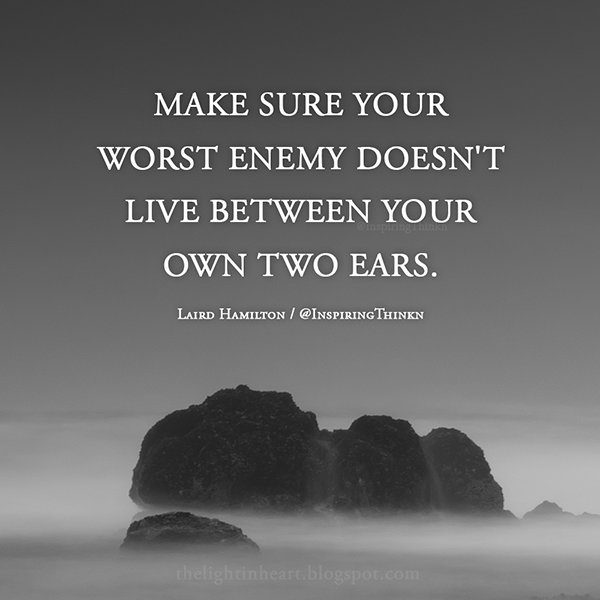
“Make sure your worst enemy is not living between your own two ears.” ~ Laird Hamilton
 This quote is from Laird Hamilton, a professional surfer, speaking about our mind’s ability (thoughts) to tear us down or build us up. Unfortunately, we often don’t even realize when our mind is creating chaos or helping us out. The key is to recognize what is happening between our own two ears.
This quote is from Laird Hamilton, a professional surfer, speaking about our mind’s ability (thoughts) to tear us down or build us up. Unfortunately, we often don’t even realize when our mind is creating chaos or helping us out. The key is to recognize what is happening between our own two ears.
When I first came across this quote, I didn’t know that it came from a surfer, but isn’t that just so fitting? Aren’t we all trying to surf through life? We’re just metaphorically surfing our emotions? There’s a mindfulness teaching that says something like, we all have waves of emotions, some big and some small. We won’t stop having these emotional waves and we don’t want to constantly get knocked down them; we just need to learn how to surf.
Step one is the simply notice these emotional waves, when we get knocked down and generally what’s how we’re speaking to ourselves. Most of the time our internal dialogue is quite nasty and mean. Imagine if you were surfing, like Mr. Hamilton, and having a cruel internal discussion with yourself? Wouldn’t you be pretty much guaranteed to fall off the board? Or mis-time a wave? When surfing, like any professional sport, the athlete really has to believe in themselves and know they can be successful in order to succeed. They have to engage in a kind inner self-talk, not a nasty one. Those internal thoughts need to be positive and uplifting or he/she doesn’t stand a chance.
Now I know we aren’t all professional athletes, but life in general is a lot better and easier going if we do our best to lift ourselves up and have an internal talk reminiscent of how we would speak with a good friend — with compassion and kindness instead of with contempt and cruelty. As Dr. Kelly McGonigal and Dr. Kristin Neff both prove scientifically, self-compassion actually leads to much better outcomes, increased success, and less anxiety than our typical nasty inner self-talk.
When you notice you’re speaking to yourself in a nasty way, note it as a thought, and try your best to change that nasty thought to something kinder, but true. Switch your internal speech to be like something you would say to one of your best friends (not your worst enemy). As you get more comfortable with this, you could even write down the various new thoughts that counteract the nasty, knee-jerk reactions that you notice. You may need to carry around this list to refer to as needed for a little while. The list can help as a reminder to be aware, while also giving you these new ways of thinking so you don’t have the reinvent the wheel every time. Experiment with it for yourself and notice if things start to shift and change for you over time.
Kimberly Atwood is a licensed psychotherapist and certified sex therapist in private practice in Princeton, NJ. She specializes in sexual health, intimacy and relationship issues. For more information, please check out her website.
